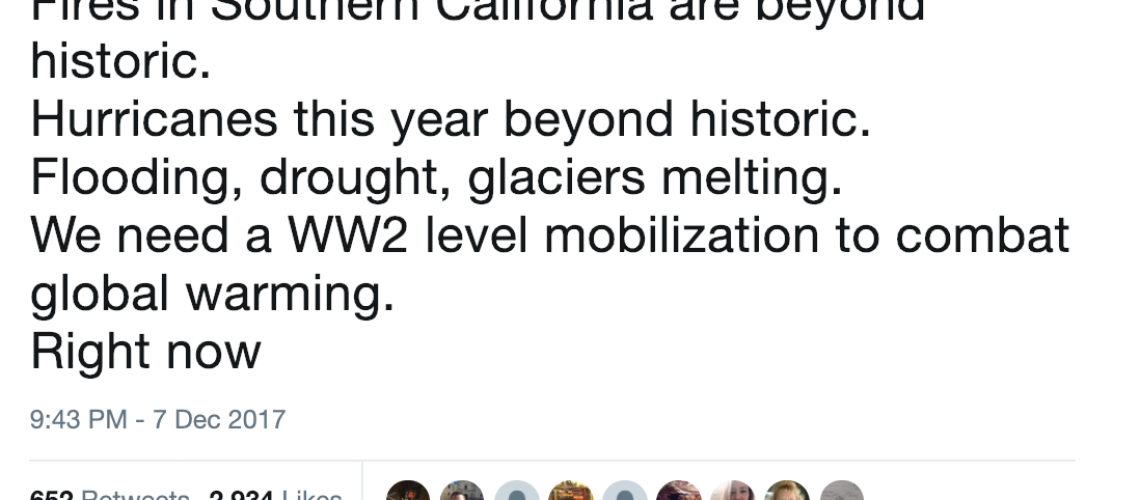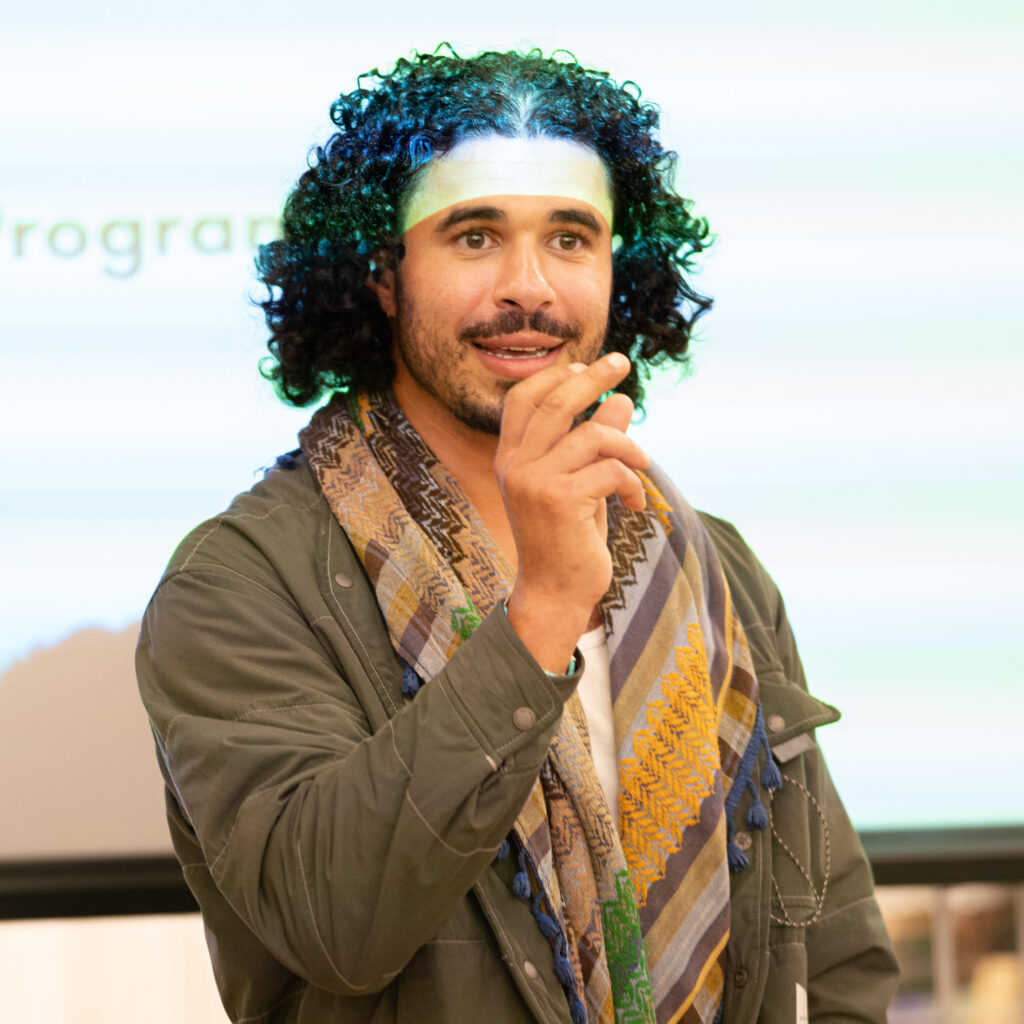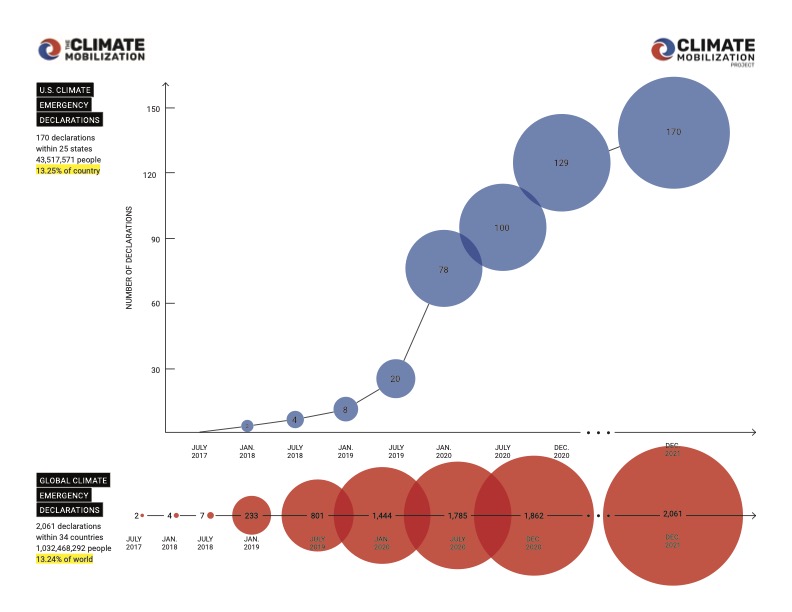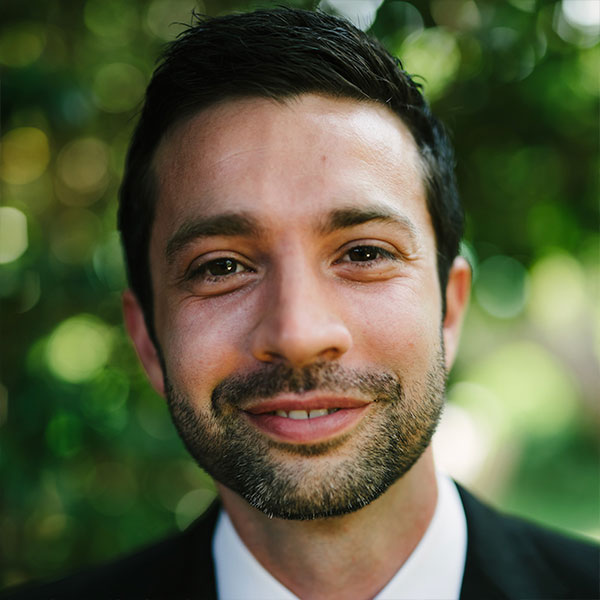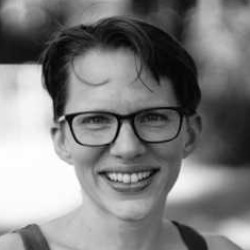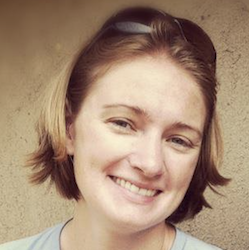On December 11, 2017, writer and director Adam McKay tweeted that we need a WWII scale climate mobilization to his almost 1 million followers.
Fires in Southern California are beyond historic.
Hurricanes this year beyond historic. Flooding, drought, glaciers melting.
We need a WW2 level mobilization to combat global warming.
Right now— Adam McKay (@GhostPanther) December 8, 2017
McKay directed The Big Short: one of the strongest climate films to come out of Hollywood. Ok, I know The Big Short isn’t technically “about” the climate crisis, but hear me out:
-
The Big Short confronts the climate crisis more explicitly than most movies do. For example, Brad Pitt’s character, Ben, believes societal collapse is imminent and that “seeds will become new currency.” In the closing credits we see that Dr. Michael Burr, the genius behind shorting the housing market is now trading in just one commodity: water. The implication is that some of the most prescient forecasters in the world are also foreseeing massive environmental collapse.
-
But more importantly, the Big Short is basically a parable about the climate crisis. For this reason, it has been on The Climate Mobilization’s “Recommended Films” list for years. A small group of people know that imminent collapse is coming and hardly anyone, and no institutions, believe them. In the “Jenga scene” banker Jared Vennett illustrates how fragile the housing market truly is (as well as how callously racist the culture on Wallstreet can be). When you pull out too many rungs, the whole thing comes crashing down.
We can imagine a Jenga game labeled with all the things that make civilization possible. Instead of A, B, AA, etc the blocks could say things like, “wheat yields,” “water access” “public health” and so on. When the climate crisis damages too many of these, the whole tower will fall: civilization itself will collapse.
-
Finally, The Big Short illustrates how it feels to understand that a crisis is coming while most people and institutions are blithely optimistic, continuing with business as usual.
Paul Gilding described this feeling in 2009:
It’s like belonging to a secret society. Conversations held in quiet places, in cafes, bars and academic halls. Conversations held with furrowed brows and worried eyes. Conversations that sometimes give you goosebumps and shivers, and a sense of the surreal – is this conversation really happening? This is what it’s felt like over the past few years, to spend time with some of the world’s leading thinkers and scientists on issues around climate change and sustainability. In public this group generally puts a positive, while still urgent interpretation of their views… But in private, often late at night, when we reflect on what we really think and wonder if the battle is lost, it’s a different conversation. The talk goes to the potential for self-reinforcing runaway loops and for civilization’s collapse. We discuss geopolitical breakdown, mass starvation and what earth would be like with just a few hundred million people.
The characters in The Big Short struggle with the social, personal, and professional consequences of predicting collapse. Their jobs are threatened and they are mocked, “They call me Chicken Little, they call me bubble boy,” Vennett says of the professional disdain he experiences for telling the truth about the coming housing crash.
People who tell the truth about the climate crisis and advocate for emergency climate mobilization understand the social costs of being outside the norm. We have made many family members, dinner party guests, and dates uncomfortable. We have experienced alienation, and relief at finding fellowship with others who understand the truth and are dedicated to solving the crisis.
Profiting from vs Preventing Collapse
The characters in The Big Short sought to profit from the coming collapse. Imagine if instead the forecasters had started organizing and getting the best progressive politicians to recognize the danger of the financial collapse and start introducing policies to reign in these financial institutions before it was too late?
That’s basically what we at The Climate Mobilization are trying to do. We could seek personal profit — shorting insurance or agricultural futures, perhaps, or buying land in Siberia. But instead, we are focused on preventing collapse.
Now we are working locally, getting Climate Emergency Declarations passed in California, and all over the country—declaring a climate emergency and committing the city to reaching zero emissions at emergency speed. Because of the efforts of our organizers and partners, more than 22 cities in the US, UK, Canada, and Australia have done so, with London declaring Climate Emergency and committing to reaching net zero emissions by 2030 in December.
In Los Angeles, we have supported the introduction of a motion calling for a Climate Emergency Mobilization Department — a city department that would oversee the rapid transition to zero emissions, as well as spread the need for emergency climate mobilization to people and other government bodies.
Seeking personal profit would be absurd, because ultimately the climate crisis threatens us all. The stakes of the housing bubble pale in comparison to the climate stakes. The only safety, the only profit, will come from preventing the Jenga set of human civilization from falling down. We want to cancel the apocalypse, and we know the only way to do that is through an all-hands on deck climate mobilization that brings America, and then the world, to zero emissions at emergency speed, and draws down excess greenhouse gases from the atmosphere.
Check out The Big Short to get a good picture of the eerie feeling of knowing collapse is imminent while everyone is acting normal. And then please consider organizing with or financially supporting The Climate Mobilization.

